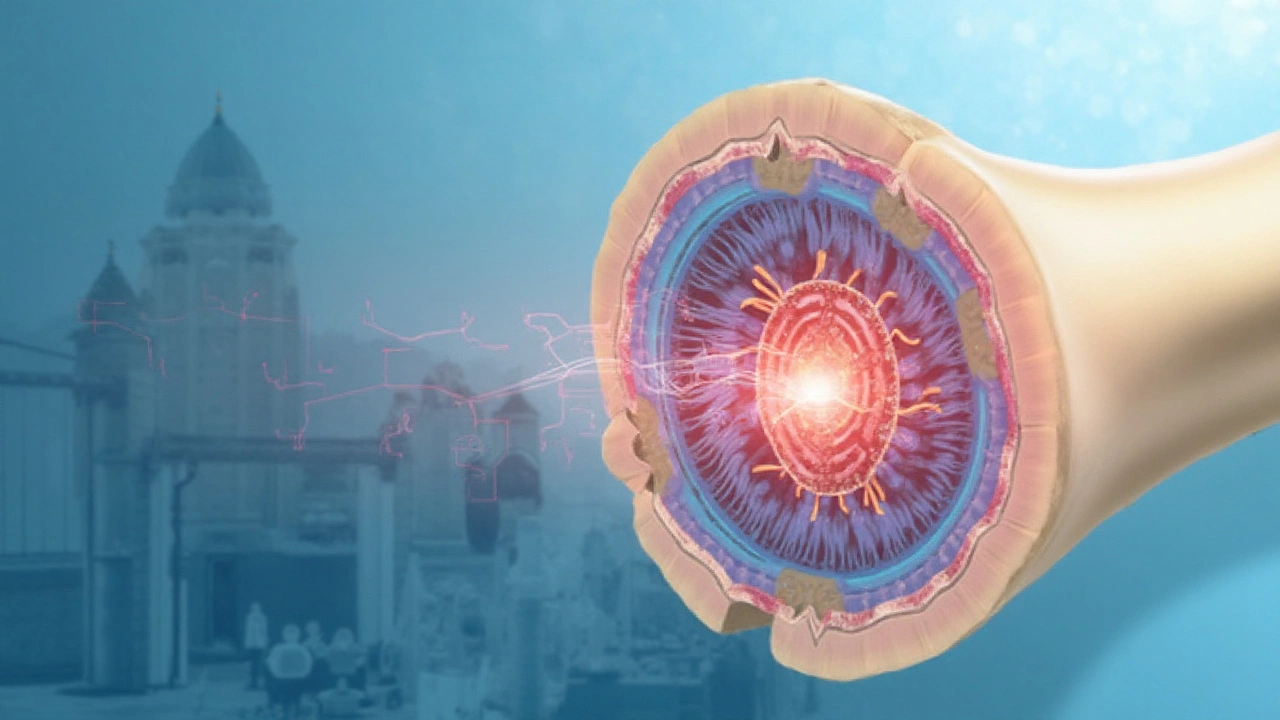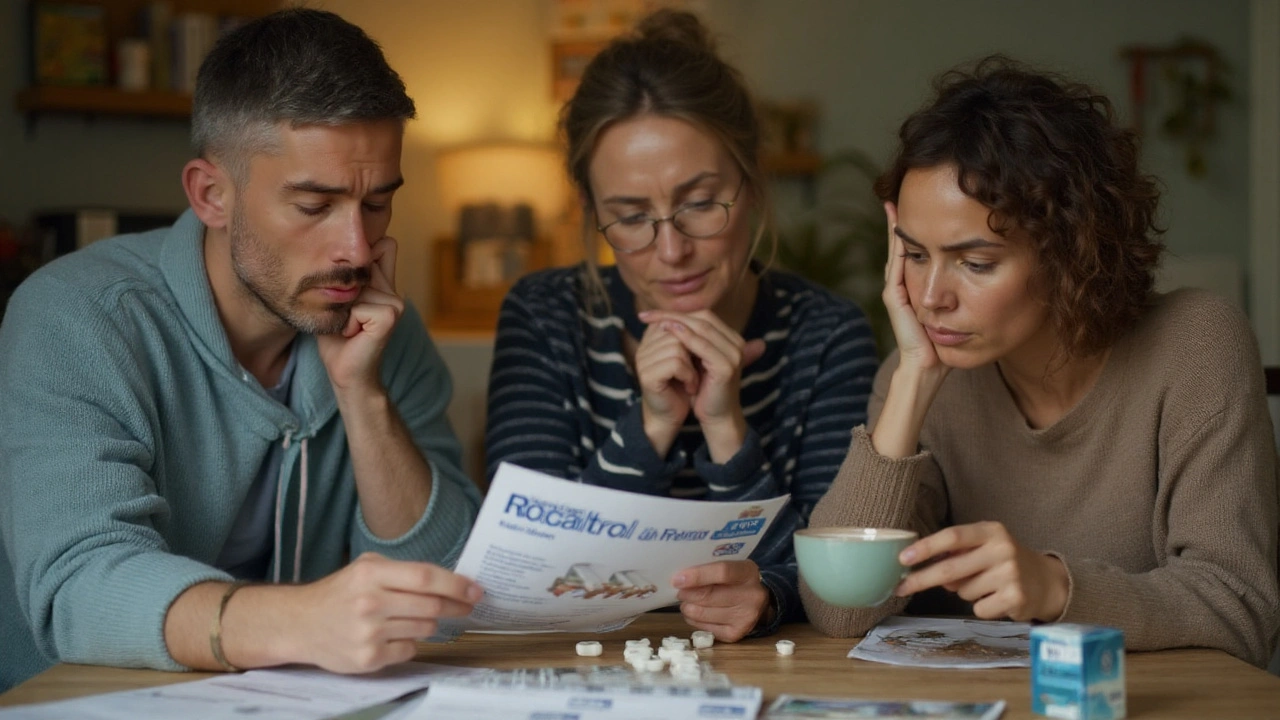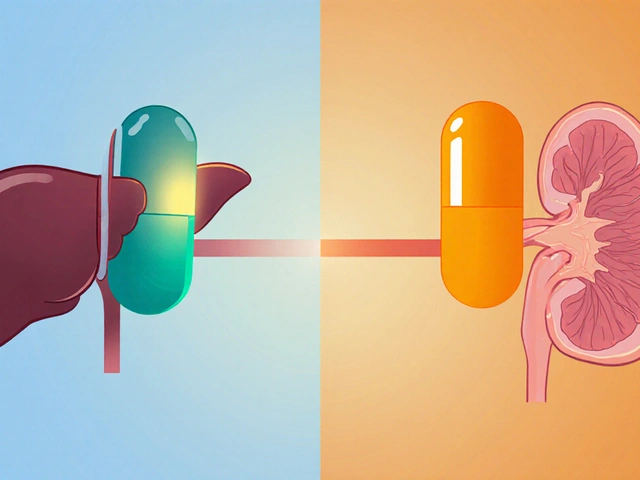Rocaltrol: Uses, Effects, and Tips for Managing Calcium Levels

You've probably never thought much about the tiny hormone shifts happening in your body that control how you absorb calcium. Yet, if you struggle with certain kidney issues or problems with your parathyroid glands, those subtle shifts can quickly turn your world upside down. Enter Rocaltrol. This isn’t just another vitamin D supplement off the shelf at the pharmacy. No, Rocaltrol (known by its generic name, calcitriol) works like the active form of vitamin D your body usually makes with the help of sunshine. Sounds simple, right? But for people with chronic kidney disease, hypoparathyroidism, or osteoporosis, getting that active vitamin D is anything but straightforward.
How Rocaltrol Works in the Body
Before we dive into who might actually need this medication, let’s break down what Rocaltrol does once it enters your system. At its core, Rocaltrol is a form of calcitriol. This is not just another member of the vitamin D family—you can think of it as the boss. While most vitamin D supplements contain ergocalciferol (D2) or cholecalciferol (D3), those still have to get activated in your liver and kidneys. If you’ve got kidney troubles, that step doesn’t happen so well, and the body can’t turn those supplements into the strong stuff.
Rocaltrol, by contrast, jumps straight to the finish line. It helps your gut absorb more calcium and phosphate, two minerals that keep your bones strong and nerves working right. Here’s the kicker: this also lets it help balance parathyroid hormone (PTH), which your body uses to regulate calcium levels. When the parathyroid gland is underperforming or absent, your calcium levels can zigzag, leaving you with muscle cramps, bone pain, or worse.
For some people with chronic kidney disease, their kidneys are no longer up to the job of producing calcitriol by themselves. So, doctors prescribe Rocaltrol to sidestep that broken system. It’s like having a shortcut that doesn’t depend on an organ running at half speed. In people with secondary hyperparathyroidism—where PTH goes through the roof because of low calcium—Rocaltrol brings those wild hormone swings down to earth.
But you know what’s wild? Your body is incredibly picky when it comes to calcium. Too little, and your bones break down; too much, and it can clog up kidneys or arteries. That’s why doctors monitor anyone taking Rocaltrol very closely. They want to hit that Goldilocks sweet spot.
| Key Function | Role in the Body | Related Issues |
|---|---|---|
| Calcium absorption | Helps absorb dietary calcium in the gut | Osteoporosis, weak bones |
| Phosphate regulation | Boosts phosphate levels for bone health | Chronic kidney disease complications |
| PTH balance | Keeps parathyroid hormone in check | Hyperparathyroidism, muscle spasms |
One memorable story involves a teenager with chronic kidney disease who couldn't keep bone pain at bay, despite all the milk and supplements he could stomach. Only after his doctor put him on Rocaltrol did his lab numbers stabilize—and he could walk to school pain-free. That’s a practical win.

Who Needs Rocaltrol (and Who Doesn’t)
This isn’t something you take on a whim. If you flip through medical guidelines, you don’t see Rocaltrol handed out for the general aches and pains or as a preventive supplement like generic vitamin D. Instead, it’s got a few specific targets:
- Chronic kidney disease: When kidneys can’t turn regular vitamin D into calcitriol, Rocaltrol fills that gap.
- Hypoparathyroidism: For people whose parathyroid glands can’t keep calcium at a healthy level.
- Pseudohypoparathyroidism: When the glands work but your tissues ignore PTH’s instructions.
- Osteoporosis (some cases): Especially if it’s linked to calcium or vitamin D problems.
For anyone outside those groups, it’s not the go-to choice. Why? Because this is a medicine that works by changing how your gut and kidneys handle minerals, sometimes fast. If you don’t have a medical reason for that boost, you could set off more problems than you solve. Taking Rocaltrol when you don’t need it can lead to hypercalcemia, which can actually damage your kidneys or lead to kidney stones.
If you’re on dialysis, your medical team will probably talk about this drug at some point. They’ll weigh a bunch of lab results each time, like your calcium, phosphate, and PTH levels, to see if you even need it. Taking Rocaltrol along with a high-calcium diet or certain diuretics pushes your risk higher, so they’re always on guard for signs of overload—think headache, tiredness, confusion, or even constipation that won’t go away. Sounds dull, but those symptoms can sneak up fast.
Ever wonder if kids or elderly folks use Rocaltrol differently? Kids with rare metabolism conditions might get this medicine, but only under tight control, since their bones and kidney function are still developing. The elderly might be extra sensitive to shifts in calcium, which can throw off the balance of the heart and muscles. So doctors start low, go slow, and monitor often.
If you’re looking at the generic version, calcitriol, it acts just like Rocaltrol. Insurance companies or pharmacists often swap them depending on what’s available. Just remember to double-check with your doctor or pharmacist if any changes happen—all these vitamin D analogs aren’t interchangeable at other doses or for all uses.

Handling Side Effects and Maximizing Benefits
What can go wrong with a drug that’s basically a ‘super vitamin D’? Turns out, a fair amount—if you don’t follow the program right. The biggest risk is having too much calcium in your system (hypercalcemia). That can build up over days or weeks, sometimes showing up as nausea, vomiting, a lack of appetite, or constipation. If left unchecked, it can lead to all sorts of complications, from kidney stones to mental confusion to irregular heartbeat. It’s not the kind of issue anyone wants to deal with, especially if you already have a chronic illness.
On the flip side, used right, Rocaltrol keeps bones stronger, muscles less irritable, and blood test results looking a lot more stable. So how do you make sure things go your way?
- Work closely with your doctor. Rocaltrol requires regular lab checks—sometimes every few weeks at first. Make sure you don’t skip these.
- If you spot symptoms like tiredness, too much thirst, or muscle weakness, mention them right away. Small changes can mean bigger problems later.
- Watch your diet. Just because you’re on a vitamin D analog doesn’t mean you should load up on cheese, milk, or calcium-heavy supplements unless your doctor gives the green light.
- Avoid taking magnesium-based antacids or other high-calcium products unless cleared by your care provider. These can add fuel to the fire, increasing calcium even more.
- Follow your dose instructions exactly. Calcitriol’s dose isn’t one-size-fits-all. It can be tweaked often until it fits your numbers just right.
If you’re busy or tend to forget medications, try setting a phone alarm or syncing your dose with another daily habit. Missing doses here and there can mess up your calcium numbers—either pushing them too low or rebounding too high if you double up.
According to a 2023 review in the journal "Nephrology Dialysis Transplantation," nearly 1 out of 5 patients on Rocaltrol for chronic kidney disease needed at least one dose change during the first six months. This tells you just how dynamic your body’s mineral needs are, and why you can’t ever slip into autopilot mode.
| Common Rocaltrol Side Effects | Percent of Users Experiencing |
|---|---|
| Hypercalcemia | 15-20% |
| Nausea/vomiting | 10-15% |
| Fatigue/weakness | 8-10% |
| Mild constipation | 5-7% |
Does insurance cover Rocaltrol? In most places—including the U.S., UK, and Australia—yes, if you have an approved condition. If you’re looking to save some cash, the generic (calcitriol) works the same, but always check with your doctor about the pharmacy swap.
So what’s the bottom line? If Rocaltrol is on your prescription list, you have unique needs that most ‘off the shelf’ vitamin D supplements won’t touch. It’s powerful, but it demands respect. Your best bet: follow your doctor’s plan, stay on top of blood tests, and speak up if you notice unusual symptoms. Your bones—and the rest of your body—will thank you for it.



Shelby Rock
Ever think how a tiny hormone can flip the script on your whole body? It's like the universe whispering, "hey, pay attention to the calcium" and most of us just nod, clueless. When kidneys start slacking, the magic calcitriol-Rocaltrol-steps in like a backstage hero. Still, most folks dont even realize the cascade that leads from sunshine to bone health, and that gap can feel like a silent thief, robbing you of strength. The philosophy behind tweaking these levels is simple yet deep: balance over excess, harmony over chaos. So yeah, Rocaltrol ain’t just another pill, its a reminder that even the smallest shifts can change the whole narrative of health.
Dhananjay Sampath
Great point, and to add, when you’re navigating the labyrinth of calcium regulation, it’s crucial to keep a close eye on lab values, stay consistent with dosing, and communicate openly with your care team; this ensures you’re not overshooting the sweet spot, and it helps prevent those dreaded spikes that can lead to hypercalcemia, which, let’s be honest, nobody wants dealing with.
kunal ember
Delving into the mechanics of calcitriol, it becomes apparent that the active form of vitamin D operates not merely as a supplemental nutrient, but as a pivotal regulator of gastrointestinal calcium absorption, renal phosphate handling, and parathyroid hormone feedback loops, thereby orchestrating a complex symphony of mineral homeostasis; this intricate interplay underscores why clinicians monitor serum calcium, phosphate, and PTH levels with a frequency that may seem excessive to the uninitiated, yet is justified by the narrow therapeutic window that Rocaltrol occupies. When patients with chronic kidney disease receive Rocaltrol, the drug essentially bypasses a dysfunctional renal conversion step, delivering activated vitamin D directly to target tissues. However, this convenience carries inherent risks: an unanticipated increase in calcium absorption can precipitate hypercalcemia, which in turn may cause vascular calcification, renal stones, or even cardiac arrhythmias. Consequently, dose titration often follows a "start low, go slow" paradigm, with adjustments based on serial laboratory results and clinical symptomatology. Moreover, the relationship between calcium and phosphate is not linear; excess calcium can suppress phosphate excretion, further complicating management in dialysis-dependent patients. It is also worth noting that dietary calcium intake must be coordinated with pharmacologic therapy to avoid synergistic overload. Patient education, therefore, plays a critical role, emphasizing adherence to scheduled blood work, awareness of subtle symptoms such as fatigue or polyuria, and avoidance of over-the-counter calcium supplements unless expressly prescribed. In summary, while Rocaltrol offers a lifeline for those with impaired endogenous calcitriol synthesis, its administration demands vigilant oversight, interdisciplinary collaboration, and a nuanced understanding of mineral physiology to achieve the desired therapeutic outcomes without incurring avoidable adverse events.
Kelly Aparecida Bhering da Silva
Listen, the mainstream medical establishment loves to push this “miracle drug” narrative, painting Rocaltrol as a panacea for any calcium‑related woes while conveniently glossing over the hidden agenda of Big Pharma to lock patients into endless prescription cycles. They claim it’s only for those with kidney or parathyroid issues, yet the same guidelines are being watered down to capture a wider market, all under the guise of "preventive health." It’s no coincidence that the same companies funding the research also control the supply chain, ensuring that once you’re on the medication, you’re financially tethered to their brand. If you look at the data, you’ll see that adverse events are under‑reported, and the long‑term consequences of chronic hypercalcemia are conveniently omitted from the patient information leaflets. So, before you swallow that pill, ask yourself who truly benefits from this so‑called therapeutic advance.
Michelle Dela Merced
OMG, can we just talk about how dramatic this whole Rocaltrol thing is?! 😱 I mean, picture this: a teen with kidney issues finally gets relief and can walk to school without wincing-total game changer! 🌟 But then you hear about the hypercalcemia horror stories, and it’s like, "Hold my coffee, I’m scared!" 😂 Seriously, this drug is like a rollercoaster of hope and dread, all wrapped up in a tiny pill. Stay safe, folks, and keep those labs in check! 💊💥
Alex Iosa
From a strictly clinical perspective, the administration of calcitriol must be accompanied by a regimented monitoring schedule, as the propensity for iatrogenic hypercalcemia presents a non‑trivial risk. Moreover, the potential for pharmaceutical collusion to obfuscate adverse event reporting cannot be dismissed without scrutiny; independent verification of trial data remains paramount. It is incumbent upon healthcare providers to maintain vigilance, ensuring that therapeutic benefits unequivocally outweigh potential harms.
melissa hird
Ah, the ever‑so‑elegant Rocaltrol-because what could possibly go wrong when we hand out hormone analogues to the masses? One might expect a modest side‑effect profile, yet we are gifted with a cascade of hypercalcemia cases that could rival any dramatic television plot. Truly, the medical community's subtlety in addressing these concerns is as refined as a toddler’s finger painting. One can only admire the sheer confidence required to prescribe such a potent agent without the fanfare of a safety warning that matches its potency.
Mark Conner
Look, we all love our freedoms, but handing out Rocaltrol without proper oversight is like giving a loaded gun to a kid-purely reckless. If the gov’t and big pharma keep blowing smoke up our asses about "benefits," we need to call that out and demand real transparency. No more silent acceptance of whatever they push onto us.
Charu Gupta
While the clinical utility of calcitriol is undeniable, it is essential to adhere strictly to dosing recommendations to avoid iatrogenic complications. Moreover, I must emphasize the importance of precise terminology in patient education; misuse of lay terms can lead to misunderstandings and non‑compliance. 😇 Please ensure that all communications reflect the correct dosage units and potential side‑effects.
Abraham Gayah
Honestly, the whole hype around Rocaltrol feels like a stage‑coach performance-raise the curtains, throw in some scientific jargon, and let the audience applaud without questioning the understudy’s credentials. It's all smoke and mirrors, darling.
rajendra kanoujiya
Everyone’s making a big deal out of this, but it’s just a vitamin D analog.
Caley Ross
Just a heads‑up: if you’re on Rocaltrol, keep an eye on your labs and stay consistent with your doses-no need to turn it into a drama.
Bobby Hartono
Okay, so let me lay it out clearly because I know sometimes the medical speak can get confusing for folks just trying to stay healthy. First off, Rocaltrol is the active form of vitamin D, which means your body doesn’t have to go through the extra steps of converting D2 or D3 into something useful. That’s especially important if your kidneys are not doing their job properly. Secondly, because it’s so potent, you really have to stick to the dosing schedule your doctor gave you-no skipping, no doubling up, and definitely no adding extra calcium‑rich foods thinking you’ll get a bonus. I’ve seen patients who think, "more is better," and then they end up with hypercalcemia, which can cause nausea, fatigue, and even serious kidney problems. So, keep those follow‑up blood tests on schedule, and be honest with your provider about any symptoms you notice. A little bit of mindfulness goes a long way, and you’ll avoid the hassle of dealing with complications later. And remember, just because it’s a prescription drug doesn’t mean it’s a free‑for‑all-insurance may cover it, but you still have to prove the medical necessity, so keep that paperwork tidy.
George Frengos
It is my pleasure to encourage anyone on Rocaltrol to maintain a balanced approach; consistent monitoring, open dialogue with healthcare professionals, and adherence to prescribed regimens are the pillars of safe and effective therapy. By fostering an environment of mutual respect and informed decision‑making, we can optimize outcomes while minimizing adverse events.
Jonathan S
Let me be absolutely clear: the casual dismissal of Rocaltrol’s potential hazards is nothing short of irresponsible. While the drug certainly has a place in managing hypoparathyroidism and CKD‑related deficiencies, the complacent attitude that "just take it" ignores the profound implications of sustained hypercalcemia-a condition that can precipitate cardiovascular calcification, renal insufficiency, and neurocognitive disturbances. Moreover, the ubiquitous reliance on pharmaceutical marketing to eclipse rigorous, independent scrutiny is a disservice to patients who deserve transparent risk assessments. Therefore, I implore you to approach this medication with the seriousness it warrants, and to demand comprehensive monitoring, not just a fleeting lab check. 🙄💊